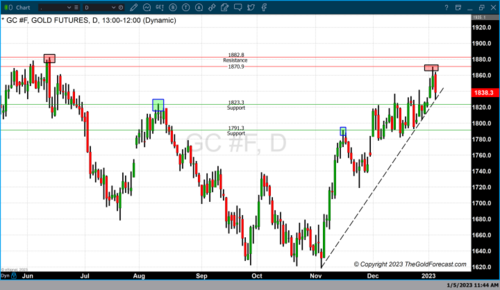
Market participants pause as they wait for tomorrow's inflation report
It is a given that the potential for inflation to decline in the December report. The assumption that inflation continues to diminish and has for the most part been factored into market pricing. Tomorrow's Consumer Price Index will occur after the strong and hawkish speech by Chairman Powell delivered yesterday at a central bank conference in Sweden.
Powell's speech did not contain new insights or flexibility that was not already addressed. It did serve to reinforce the steadfast commitment that has only strengthened over the last few months. One nuanced topic he has avoided until yesterday was that the Fed must make unpopular decisions to stabilize prices. While the words, for the most part, were different, the message continues to be the same, "The Fed is committed to maintaining interest rates at an elevated level." This idea is etched in stone.
One topic that has been absent until yesterday was that the pressure from politicians will not influence Fed policy. During his speech Chairman Powell said, "The absence of direct political control over our decisions allows us to take these necessary measures without considering short-term political factors".
There has been no change by the Federal Reserve to deviate from its current objective which is to take its benchmark rate to just above 5% and maintain an elevated level throughout the entire year.
This means that regardless of how much headway has occurred between November and December and how deeply inflation has been diminished it seems highly unlikely that it will influence the Federal Reserve to let up on its aggressive monetary policy and rate hikes. The Fed is so overwhelmingly focused on not letting inflation become more entrenched in the economy that it seems that they are not seeing the forest from the trees.
Inflation continues to be extremely persistent with certain sectors that cannot be influenced by the actions of the Federal Reserve. Two of the key troublesome sectors are food and energy, the costs of which are continuing to be persistently higher. The Federal Reserve has no tools or effective means to implement a strategy that would lead to any meaningful price reduction in these two areas which happen to represent a huge portion of the average American's expenditures.
Recently the Federal Reserve Bank of New York forecasted that inflation for December will show it continues to diminish. Expectations are that the CPI will show inflation is easing at approximately 6.5% year-over-year. While many analysts believe that if the actual numbers come in below this forecast it will influence the Federal Reserve to backpedal its stringent commitment to keep interest rate levels elevated throughout the entire year.
If that is true tomorrow's report could have little real impact based on the belief that it will not have any dramatic influence on the current policy. In other words, tomorrow's CPI report will not have an overwhelming impact on future decisions of Federal Reserve members which beckons the question, why are investors so focused upon tomorrow's numbers?
By Gary Wagner
Contributing to kitco.com
David